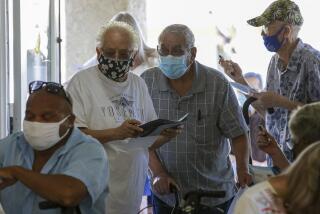Davis Proposes Sweeping Changes in Workers’ Compensation System
Standing in the warehouse of a produce wholesaler struggling with spiraling workers’ compensation premiums, Gov. Gray Davis on Thursday unveiled his initiative for reforming the ailing state system for injured workers.
The Davis plan, which includes a number of existing ideas and legislation by Democratic and Republican lawmakers, stresses the containment of medical costs, expedited care for injured workers, prompt payment of health-care providers, and reduction of legal conflicts between employees and employers.
Davis said the proposals, if adopted, would reduce workers’ compensation costs by at least $1.5 billion annually.
Davis set two goals: reducing costs for employers and improving care for injured workers.
“We can’t let this system go on,” he said, standing before boxes of California strawberries and lettuce on the warehouse floor of Nor-Cal Produce. “We are headed for a train wreck.”
Republican lawmakers and business groups have demanded changes in the California workers’ compensation system for more than a year. In recent weeks, Davis and the Legislature’s Democratic majority have voiced general agreement with Republicans on the need to make significant changes to the state workers’ compensation system, the most expensive in the country.
Assemblyman Keith Richman (R-Northridge) said he was waiting for more details on what the governor is proposing, but said he is “very willing to work in a bipartisan manner with the governor and the insurance commissioner. I am pleased that the issue of skyrocketing workers’ compensation premiums appears to have gotten the governor’s attention and the insurance commissioner’s attention.”
Many California employers say the cost of workers’ compensation insurance -- which they’re required by law to provide -- is soaring, driven by rising medical costs, legal disputes and other flaws in the system.
Todd Achondo, 30, whose family owns the produce business that Davis used as a backdrop for his announcement, said his company’s workers’ comp premiums more than tripled last year to $331,000 annually for about 100 employees.
Republicans and Democrats have proposed nearly 60 bills addressing various components of the workers’ compensation system. Davis and lawmakers from both parties agree on the need for setting fees for medical costs, as is currently done in the Medicare and Medi-Cal programs.
Among other things, Republicans also want to restrict the current definition of a work-related injury and to limit compensation for permanent disabilities. And they want to roll back an increase in benefits for injured workers that went into effect in January with the support of Davis, Democratic lawmakers and labor groups.
Insurance industry representatives say the California system is too complicated and subjective, resulting in expensive delays and legal disputes.
Davis said his proposals, combined with a number of ideas offered by Republican and Democratic lawmakers, would address those problems. He advocated standardizing costs for medical procedures, including those performed at outpatient surgery centers, a point of soaring costs in the system.
He also called for legislation that would expand the use of generic drugs, already widespread in the general health-care system.
Another key component of his plan for cutting costs would be steps to ensure that medical providers are paid promptly.
“We know from HMO reform that when you do rein in excessive fees, it’s right and fair and good for quality care to insist on prompt payment,” said Daniel Zingale, the governor’s Cabinet secretary and an expert on managed health care.
Davis stopped short of proposing regulation of insurance companies that provide workers’ compensation policies -- an idea advocated by key Democratic lawmakers, labor leaders and other interest groups.
The governor, however, said he supports requiring insurers to post their workers’ compensation rates on the Internet, which would put some downward pressure on premiums by giving consumers access to more information, Davis aides said.
Sen. Richard Alarcon (D-Sylmar) is a leading proponent of what he calls the “measured regulation” of insurance providers to prevent price-gouging in workers’ compensation insurance premiums. Alarcon’s Senate Bill 191, however, would prohibit “excessive” fees.
Insurance Commissioner John Garamendi, who appeared with the governor, said another potential area of savings would be more vigorous efforts to combat fraud in the workers’ compensation system.
Davis described his initiative as bipartisan and vowed to work with Republicans as well as Democrats in his pursuit of workers’ compensation reform. But there are some fundamental differences.
Republicans want to make it more difficult to prove that an injury was work-related. They also want to delay increased workers’ compensation benefits that went into effect in January with the support of Davis and Democratic lawmakers.
More to Read
Get the L.A. Times Politics newsletter
Deeply reported insights into legislation, politics and policy from Sacramento, Washington and beyond. In your inbox three times per week.
You may occasionally receive promotional content from the Los Angeles Times.






